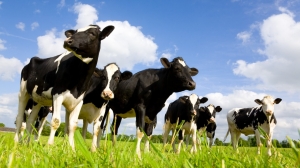State Veterinarian Issues Order for Dairy Cattle Movement

NASHVILLE – In response to the USDA confirmation of highly pathogenic avian influenza (HPAI) in dairy cattle in four states, the State Veterinarian has ordered a movement restriction on dairy cattle coming to Tennessee from the affected premises.
As of April 1, 2024, Texas, Kansas, Michigan, and New Mexico had confirmed cases of HPAI in dairy cattle and results for a presumptive positive test for a herd in Idaho are pending at the National Veterinary Services Laboratories (NVSL). NVSL confirmed that the strain is H5N1, which has been circulating in wild birds for the last several years and appears to have been introduced to these herds by wild birds.
Although there have been no detections of HPAI in cattle in Tennessee, producers are reminded to practice strong biosecurity. Cattle owners should minimize animal movements and isolate sick cattle. New animals should be quarantined for a minimum of two weeks before introducing them to an established herd.
Cattle impacted by HPAI may exhibit low appetite, flu-like symptoms, and thick and discolored milk accompanied by a sharp reduction in milk production. No cattle have died from infection. Older cows may be more likely to be severely impacted than younger cows. If Tennessee dairy producers believe cattle within their herd are showing clinical signs of HPAI, they should report these signs immediately to their local veterinarian, to the State Veterinarian’s Office at 615-837-5120, or the USDA APHIS at 1-866-536-7593.
The CDC confirmed on April 1, 2024 that a person in Texas tested positive for HPAI following exposure to affected cattle. The individual’s illness is mild, and they are recovering.
There is no concern about the safety of the commercial milk supply. Dairies are required to send only milk from healthy animals into processing for human consumption. Milk from impacted animals is being diverted or destroyed so that it does not enter the food supply.
In addition, pasteurization effectively kills bacteria and viruses like influenza in milk and is required for any milk entering interstate commerce. Consumption of raw milk is strongly discouraged. Additional information regarding milk safety during HPAI outbreaks is available from the Food and Drug Administration.
Federal, state, and industry partners are working in coordination to monitor cattle illnesses and minimize the impact to farmers, consumers, and other animals.
The Tennessee Departments of Agriculture and Health work closely together to help protect and improve the health of animals and people as part of the long-standing Tennessee One Health Committee. One Health is the collaborative effort of multiple disciplines to attain optimal health for people, animals, and the environment.